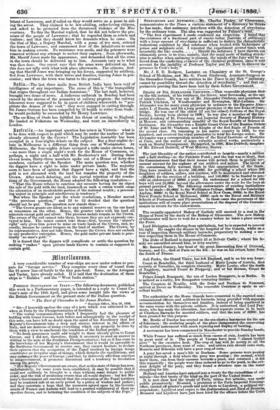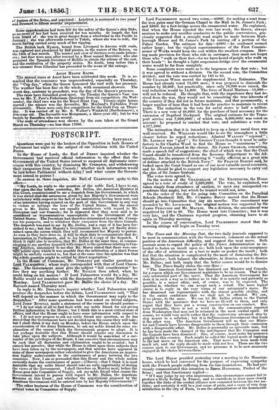Zigultuutans.
A very considerable number of war-ships are now under orders to pre- pare for "foreign service." They comprise every class of vessel from the 91 screw line-of-battle to the tiny gun-boat. Some, as the Arrogant and Tartar, have already sailed. It is said that the destination of these ships is " Halifax " and the " West India station."
FOREIGN OccurAnow or ITALY.—The following document, published tm this week in a Parliamen paper, reply . is intended as a to Count Ca-
vour's note of the 16th Ap • i
and gives some insight into the views of the British Government on e present state of the Italian question.
" The Earl of Clarendon to Sir Tames Hudson.
" Foreign Office, May 2G, 1856. " Sir—I herewith enclose the copy of a note which was addressed to me when at Paris by the Plenipotentiaries of Sardinia.
" The verbal communications which I frequently had the pleasure of holding with Count Cavour, both before and subsequently to the receipt of this note, can have left no doubt upon the mind of bis Excellency that her Majesty's Government take a deep and sincere interest in the affairs of Italy, and are desirous of doing everything which can properly be done by them with a view to ameliorate the condition of the Italian people.
"No fresh assurances could add weight to those already given to Count Cavour, and I did not, therefore, think it necessary to send an answer in writing to the note of the Sardinian Plenipotentiaries; but as it has come to the knowledge of her Majesty's Government that it would be agreeable to the Sardinian Government to receive one, they cannot hesitate to declare their opinion that the occupation of the Papal territory by foreign troops constitutes an irregular state of things, which disturbs the equilibrium, and may endanger the peace of Europe ; and that, by indirectly affording sanction to misgovernment, it promotes discontent and a tendency to revolution among the people.
"Her Majesty's Government are aware, that as this state of things has now, unfortunately, for some years been established, it may be possible that it could not suddenly be brought to a close without. sonic danger to public order, and the risk of producing events that all would deplore : but her Ma- jesty's Government are convinced that the evacuation of the Papal territory may be rendered safe at an early period by a policy of wisdom and justice ; and they entertain a hope that the measures agreed upon by the Govern- ments of France and Austria will lead to a gradual withdrawal of their re- spective forces, and to bettering the condition of the subjects of the Pope." STRYCIMME AND ANTI]fONY.—Mr. Charles Pooley, of Cirencester, communicates to the Times a curious statement or a discovery he thinks' he has made, that antimony interferes with the detection of strychnine by the ordinary tests. The idea was suggested by Palmer's trial. "The The first experiment I made confirmed my suspicions. I found that the existence of a fractional part of emetic tartar (tartrate of antimony)'` with a large amount of strychnine is sufficient to destroy the characteristic. indications exhibited by that substance when treated with 'bichromste of potass and sulp_huric acid. I repeated the experiment several times with invariably the like results Should the inference I have thrown out • ultimately prove to be true, namely, that the usual mode of finding strych-- nine is useless when antimony is present, the minds of the Jury will be re- lieved from the conflicting evidence of the chemical professors, since it will • account for the inalldity of Professor Taylor and Dr. Rees to discover its presence in Cook's y.
Mr. J. E. D. Rodgers, Lecturer on Chemistry at the St. George's School of Medicine, and Mr. G. Prout Girdwood, Assistant-Surgeon in the. Grenadier. Guards, have written to the Times to say that " antimony- cannot by possibility thwart the detection of strychnine " ; and that ex- periments proving this have been laid by them before Government.
DEATH or Sin ALEXANDER, CRICBTON.—This venerable physician died- on the 4th instant, at his residenoe, the Grove, 'near Seveftwis, at the age
of ninety-three. He was son of Mr;Alexander. Crichton'. and grandson of Patrick Crichton, Of Woodliouselee and Newingtot, Mid-Lothian. Sir Alexander was for many years physician in ordinary to the Emperor Alex-, ander I. of Russia, and for a long period physician to the late Duke of Cara- . bridge. He was one of the -oldest (if not, the.oldest) Fellows of the Society, having been elected- in 1800 ; he was also a member of the Im- perial Academy of St, Petersburg and Imperial Society of Natural History at Moscow, and corresponding menilki' of the Royal Society of Science at Gottingen. Sir Alexander was a Knight Grand Crostref the Russian Ordersi' of Bti: knife and St Vladimir, and Knight of the Red Eagle of Prussia. of the second class. On returiung to his native country in 1820, he was knighted, and received the royal permission to wear his foreign orders. Sir Alexander was a corresponding member Of the Boyar-Institute- of Medicine at Paris, and the author of some valuable medical, works, particularly a work on Mental Derangement: Rewarded, in 1800,- pothook daughter of Mr. Edward Dodwell, of West-MUleaey, Surrey. • The just liberality of the nation contributed so largely—nearly a million and a half sterling--to the Petriotie Fund ; • and the war was so short, that . the Commissioners find that their means will, permit them . to provide ner- motion succour for the orphans of our soldiers and sailori. The ternit of the COMMill8i011 fully warrant them in this appropriation of the funds_ They, have resolved to devote 169,000/. for providbg a school where 300- daughters of soldiers, sailors, and marines, will be maintained and echicated -729,9001. for the erection of a building, and 140,0001. to. be funded to pro-' vide an endowment of -50001. a year. An endowment for a school for 100 boys will cost 25,000/. beyond the allowances under the scale for the boys at present provided for. The following endowments of existing institutions are to be made---26,000/. to the Wellington College, 3000/. to the Cambridge Asylum., 8000/. to the Royal Naval School at New Cross' 60001. to the Royal Naval Female School at Richmond, 25001. each to the Naval and Military Schools at Portsmouth and Plymouth. In these cases the governors of the institutions will of course place presentations at the disposal of the Commis- sioners in return for the endowments.
The authoritietrat the Horse Guards have consented to the married non-. commissioned officers and soldiers in barracks being provided with-separate accommodation for themselves and families, instead of being. quartered in the same rooms with the private soldiers. It is understood that Lord Pan- inure, who has made the alteration,- has ordered separate rooms to be built at Chatham Barracks for married soldiers, and that the sum of 60001. has been granted for this purpose.
Mr. Brodie of Dunbar has erected on the sea-shore a barometer for the use of fishermen : the seafaring people of the place inaugurated the uncovering of the useftil instrument with much rejoicing and display of bunting.
A movement has been commenced in Manchester to provide Sunday bands.
While France has suffered so-much from excess of rain, Austria has been in great need of it. The people at Vienna have been " almost broiled alive" by the excessive heat. The crop of hay will be scanty in all the Northern provinces, from want of rain; and unless rain should come soon, Moravia and Bohemia will have a poor crop of corn.
A pony has saved a man's life at Durham. Some persons were passing at night through a field where the pony was grazing ; the animal, which knew them, ran from their caresses towards a pond, and returned ; it did this repeatedly ; the people were thus induced to go to the pond, to the evi- dent delight of the pony, and they found a drunken man in the water struggling for life. Holland and America have entered into a treaty for the extradition of cri- minals—the first treaty of the kind on the part of the United States.
It is now clear how the treaty of Paris, minus five articles, was made public prematurely: Brossard, a pressman at the Paris Imperial Printing- office, carried off prmter'a proofs and sold them to Lejolivet, a political cor- respondent; Lejolivet sent copies to the Independance and Nord of Brussels. Brossard and Lejolivet have just been tried for the offence before the Court
mily are assembled around him, in deep anxiety. • Mr. Samuel Gurney, late head of the great discounting firm of Overend, Gurney, and Co., died at Paris on the 6th: he was on his return home from the South of France.
Aali Pasha, the Grand Vizier, has left England, and is on his way home,
Count de Bombelles, thd third husband of Marie Louise of Austria, died recently at Versailles, in complete obscurity. Marie Louise, after the death of Napoleon, 'married' Count de Niepperg ; and at his &tease, 'Count dw
Boinbellea.; • Prince Joseph Bonaparte, the son of Lucien Bonaparte, is at Berlin. It is noticed as a rarity, few Bonapartes venturing thither.
The Counteis de Neuilly, with the Duke and Duchess de Nemouri, arrived at Dover on Wednesday. The venerable Countess is again in ex- cellent health. The recently-appointed Bishop of Carlisle will succeed to a seat in the House of Peers-by the death of the Bishop of Gloucester. The new Bishop of Gloucester will have to wait for a vacancy before he takes a place among the Peers.
Lord Ebrington is suffering from ophthalmia, but he is expected to recover his sight. He caught the disease in the hospital of the Guards, while on a tour of inspection through military barracks, preparatory to making a mo- tion respecting them in the House of Commons.
The Duke of Rutland is dangerously ill at Belvoir Castle; where his fa- of Assizes of the Seine, and convicted : Lejolivet is, sentenced to two years' and Brossard to fifteen months' imprisonment.
Some apprehensions had been felt for the safety of the Queen's ship Dido, as no news of her had been received for ten months. At length she has been heard of : she was in great danger from a whirlwind in the Pacific in January ; she was afterwards towed to Tahiti, where she was to refit, the storm having carried away much of her rigging.
The British bark Hymen, bound from Liverpool to Ancona with coals, was captured and plundered by Riff pirates, in the waters of the Botoya, on the 14th of last month. The master and crew of thirteen were made prison- ers ; but four were soon after rescued by a Moor named Morobito ; who also promised the Spanish Governor of Melilla to obtain the release of the rest, and the restitution of the property stolen. No doubt, long before this a war-steamer from Gibraltar has proceeded to the scene of the outrage.



























 Previous page
Previous page